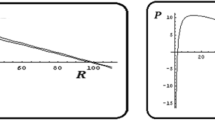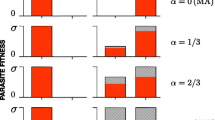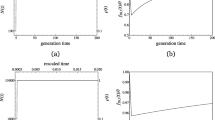Abstract
We investigate the host-parasite coevolution with mutation in a single-locus system. We use the single-locus quasi-species model with a frequency-dependent fitness landscape and find the phase diagrams for given sets of evolution parameters by means of a linear stability analysis and numerical solutions of the coevolutionary dynamics equations. For a large mutation rate, there is only one internal fixed point. However, for a small mutation rate, within the linear order approximation, we find four steady equilibrium points and one oscillatory equilibrium point. All fixed points show the polymorphism in the host and the parasite populations in the presence of mutation whereas only one oscillatory equilibrium point shows the polymorphism in the absence of mutation. By starting from random initial host-parasite populations, we determine the separatrix and the basins of attraction in evolution parameter space. In comparison with results without mutation, we show that even a very small mutation rate enhances the robustness of the oscillatory equilibrium point; therefore, mutation is significant to maintain diversity in the evolution of finite populations. We also present the corresponding stochastic model for the host-parasite coevolution, and by computer simulation, we find that the stochastic simulation results are consistent with those of the quasi-species model.
Similar content being viewed by others
References
R. M. May and R. M. Anderson, Parasitology 100, S59 (1990).
P. H. Thrall, J. J. Burdon, and A. Young, J. Ecol. 89, 736 (2001).
R. K. Grosberg and M. W. Hart, Science 289, 2111 (2000).
V. Apanius, D. Penn, P. R. Slev, L. R. Ruff, and W. K. Potts, Crit. Rev. Immunol. 17, 179 (1997).
A. V. S. Hill, Annu. Rev. Genomics Hum. Genet. 2, 373 (2001).
H. H. Flor, Adv. Genet. 8, 29 (1956).
J. L. Dangl and J. D. G. Jones, Nature 411, 826 (2001).
J. Bergelson, G. Dwyer, and J. J. Emerson, Annu. Rev. Genet. 35, 469 (2001).
E. B. Holub, Nat. Rev. Genet. 2, 516 (2001).
A. Sasaki, Proc. R. Soc. Lond. Ser. B Biol. Sci. 267, 2183 (2000).
J. Segarra, Phytopathology 95, 728 (2005).
A. Tellier and J. K. M. Brown, Proc. R. Soc. Lond. Ser. B Biol. Sci. 274, 809 (2007).
Y-G. Kang and J.-M. Park, J. Korean Phys. Soc. 64, 322 (2014).
K. J. Leonard, Ann. N. Y. Acad. Sci. 287, 207 (1977).
S. D. Jayakar, Theor. Popul. Biol. 1, 140 (1970).
Author information
Authors and Affiliations
Corresponding author
Rights and permissions
About this article
Cite this article
Kang, YG., Park, JM. Enhancement of robustness by mutation in the host-parasite coevolution. Journal of the Korean Physical Society 67, 2154–2162 (2015). https://doi.org/10.3938/jkps.67.2154
Received:
Accepted:
Published:
Issue Date:
DOI: https://doi.org/10.3938/jkps.67.2154




